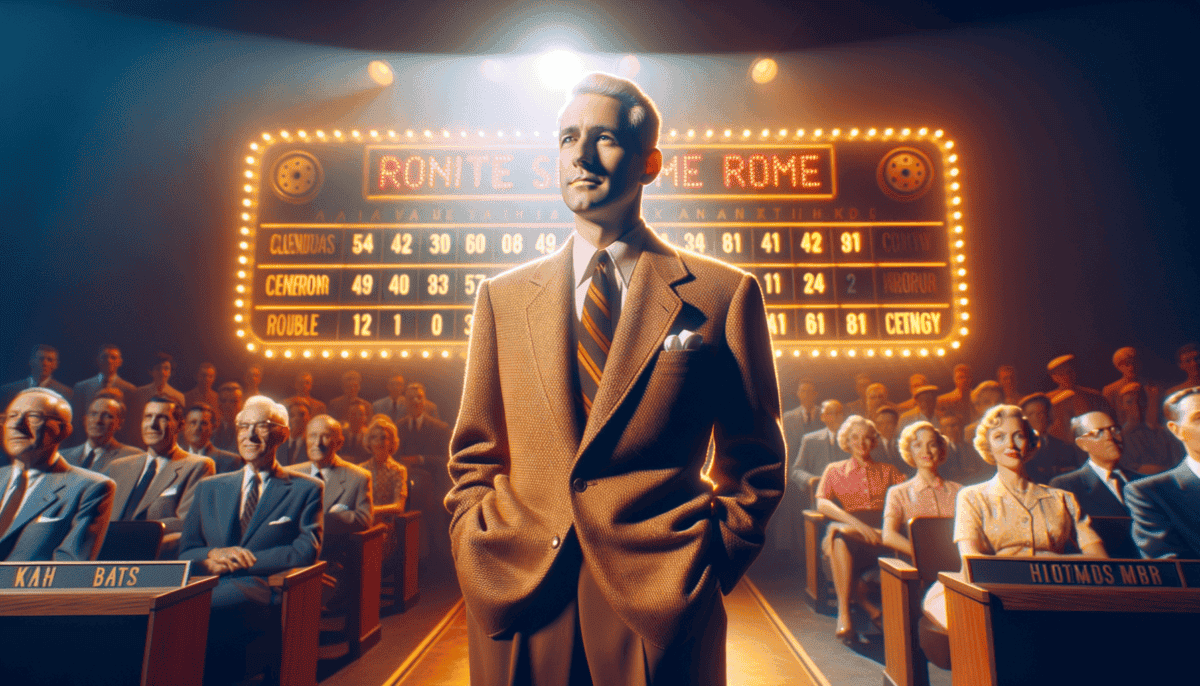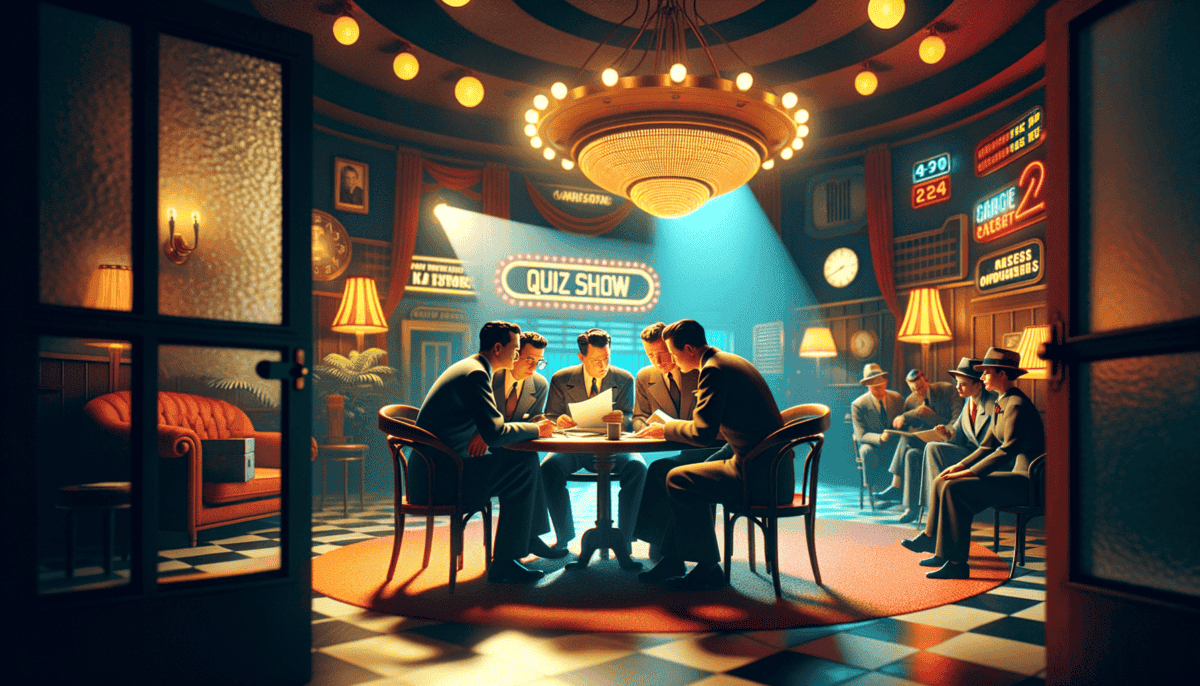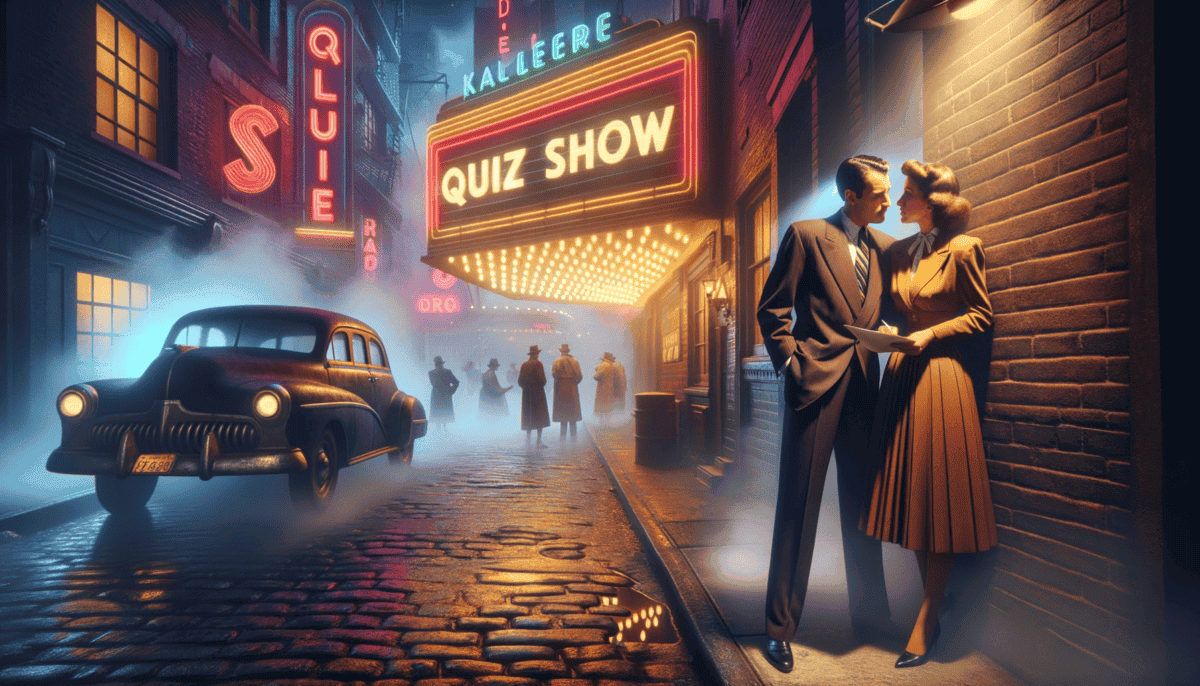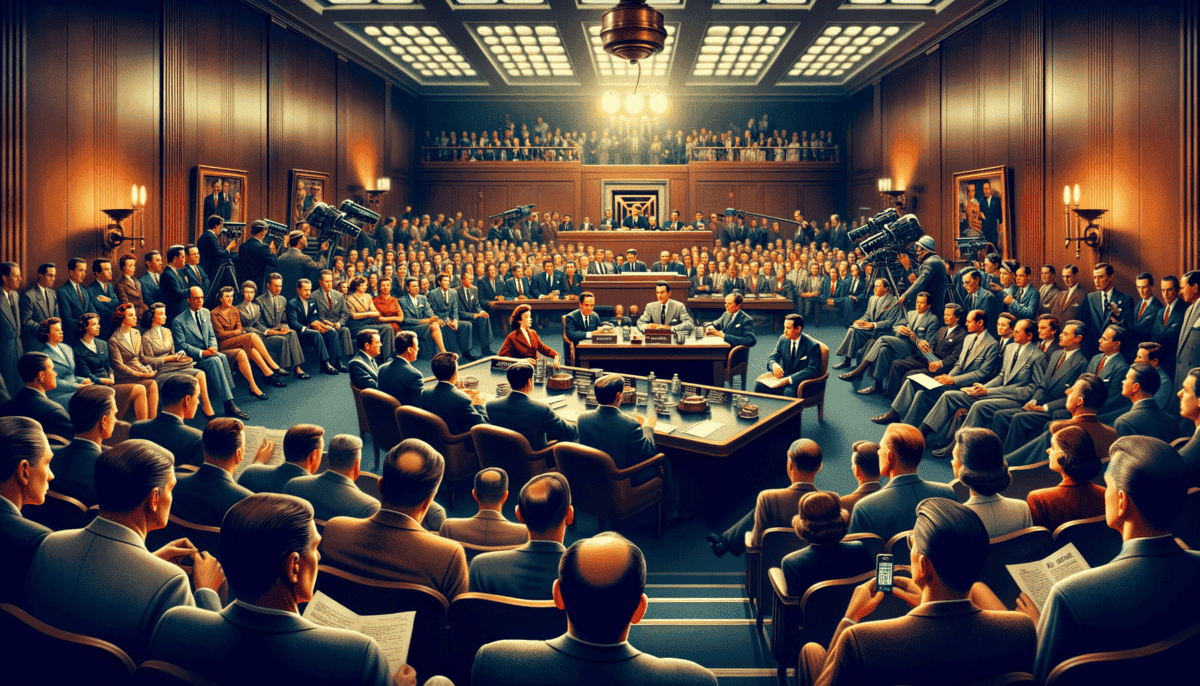A New Kind of Show
The year was 1955, and something magical was happening in living rooms across America. Families gathered around their TV sets each night, excited to watch smart people win big money on quiz shows!
"Mommy, what's happening tonight?" little Sally asked, pulling her mother's sleeve as they settled onto their comfy green couch.
"We're watching 'Twenty-One,' sweetheart. It's the most exciting show on television!" her mother replied with a smile.
The TV screen flickered to life, showing a fancy studio with bright lights. Two people stood in small glass booths, looking nervous but excited. The host, Jack Barry, wore a nice suit and had a big smile.
"Good evening, America!" Jack's voice boomed through TV speakers across the country. "Tonight on 'Twenty-One,' our contestants will battle it out for thousands of dollars!"
The audience clapped and cheered. This wasn't like any other TV show. These quiz shows were special because regular people could win more money than they'd ever seen before!
The Perfect Entertainment
TV producers had found something amazing. People loved watching smart contestants answer hard questions. It was like watching a sports game, but with brains instead of balls!
Dan Enright, one of the show's producers, watched from behind the cameras. He smiled as he saw the ratings climb higher and higher each week. But Dan had a secret. A big secret that would change everything.
"The show needs to be perfect," Dan whispered to his assistant. "The audience wants heroes and drama. We'll give them what they want."
Making Stars
The quiz shows didn't just give away money – they made regular people into stars! Teachers, professors, and everyday folks became famous overnight. Everyone wanted to know:
- Who would win the big money?
- Could they answer the hard questions?
- Would they come back next week?
"These shows are changing television forever," a network executive said proudly. But he didn't know just how much things would change.
“We’re not just making a TV show,” Dan Enright told his team. “We’re making dreams come true.”
Little did the millions of viewers know, some of those dreams were about to turn into nightmares. The shiny world of quiz shows had a dark side, and soon everyone would learn the truth about their favorite TV program.
As the studio lights dimmed that night in 1955, the seeds of one of television's biggest scandals were already growing. But for now, America watched and cheered, believing every moment was real and every answer was honest.
The show must go on – but for how long could they keep the secret?
A Professor’s Dream
Charles Van Doren walked into the NBC studios one cold morning in 1956. His hands were shaking, but not from the winter chill. Today might change his life forever.
“Professor Van Doren?” a young assistant called out. “Mr. Enright will see you now.”
A Special Offer
Dan Enright sat behind his big desk, smiling at Charles. “We need someone like you on ‘Twenty-One.’ Someone smart, someone the audience will love.”
Charles thought about his small teacher’s salary. He loved teaching, but wouldn’t it be nice to earn more? To be famous like the quiz show winners he’d seen on TV?
“Just imagine,” Dan said softly, “millions of people watching you. You could make learning exciting for everyone in America!”
The Big Night
The lights were hot and bright when Charles stepped into the glass booth for the first time. His opponent was Herb Stempel, the current champion who had won many times.
“Good evening, contestants!” Jack Barry’s voice rang out. “Tonight’s first question is worth 3 points…”
Charles wiped his sweaty hands on his pants. He knew what to do. Dan had told him exactly how to act – when to pause, when to look nervous, when to get the answers right.
America’s New Hero
People loved Charles right away! He was:
- Handsome and smart
- Kind and friendly
- From a famous family
- Great at explaining things
Letters poured in from fans. Ladies wanted to marry him. Kids wanted to be like him. Everyone wanted to watch him win more money each week!
“Did you see Van Doren last night?” people would ask at work. “How does he know so much?”
Fame and Fortune
Soon Charles was everywhere!
“Today Show wants you as a guest host,” Dan told him. “TIME magazine wants you on their cover!”
Charles was earning more money than he’d ever dreamed of. But at night, he couldn’t sleep. The lies were getting bigger, and more people were watching every week.
“Just keep going,” Dan would say. “You’re making television history!”
“I’ve created a monster,” Charles whispered to himself one night. “But I don’t know how to stop it.”
As Charles Van Doren became the biggest star on television, the weight of his secret grew heavier. He was living the American dream – but it was all built on a lie that would soon come crashing down.
Behind the Curtain
The bright lights of NBC studios hid dark secrets. Every Monday night, millions of Americans watched “Twenty-One” thinking it was real. But in a small office away from the cameras, Dan Enright was busy writing scripts.
The Perfect Show
“Remember,” Dan told his team, “we need drama! Make them sweat, make them pause. The audience loves that!”
The producers planned everything carefully:
- Who would win each week
- How long contestants would stay
- What they would say on camera
- Even when they would look nervous
Money Talks
The sponsors loved the show. Geritol, the main sponsor, saw their sales go up and up!
“Keep those ratings high,” the Geritol boss would say. “Whatever it takes!”
Dan knew exactly what it took – giving people what they wanted to see. Heroes like Charles Van Doren winning big money by being smart.
The Glass Booth Game
Inside the famous glass booth, contestants pretended to think hard about questions they already knew. They wore earpieces hidden from the cameras.
“Tap your head if you can hear me,” a producer would whisper. “Good. Now look worried for ten seconds before you answer.”
The Pressure Builds
“I can’t sleep anymore,” one contestant told Dan. “My kids think I’m so smart, but it’s all fake.”
Dan would smile and write another check. “Think about your family,” he’d say. “Think about all the good things this money can buy.”
A Growing Web
More people learned the truth each week. Makeup artists. Camera operators. Even the guy who brought coffee to the studio.
“We’re all in this together,” Dan would remind them. “Nobody wants this wonderful show to end.”
“It’s like a house of cards,” one producer whispered. “One wrong move and it all falls down.”
The quiz show kept getting bigger. But so did the number of people who knew its secrets. Soon, someone would talk – and America would learn the truth about their favorite TV show.
The Truth Starts to Leak
Herb Stempel sat in his tiny apartment, his hands shaking as he looked at his last check from “Twenty-One.” He had lost on purpose, just like they told him to. Now he couldn’t take it anymore.
First Whispers
News reporters started getting strange phone calls. “The quiz shows are fake,” mysterious voices would say. Some hung up right away. Others told stories about secret meetings and hidden earpieces.
“Something’s not right with these shows,” said Jack O’Grady, a reporter for the New York Journal-American. He started making his own calls.
More Voices Speak Up
“I was told exactly when to win and when to lose,” said a former contestant. “It was all planned like a TV show.”
Dan Enright’s office got busier than ever. But now it wasn’t about planning shows – it was about keeping secrets!
The Perfect Winner Worries
Charles Van Doren paced in his Columbia University office. Students walked by, waving at their famous teacher. But inside, he felt terrible.
“What if they find out?” he whispered to himself. “What will my father think?”
The Public Gets Suspicious
People started watching “Twenty-One” differently. They noticed things:
- Contestants touching their ears a lot
- The same dramatic pauses every time
- Winners who seemed to know exactly when to stop
Damage Control
“It’s all lies!” Dan Enright told reporters. “Our show is completely honest!”
But more newspapers started asking questions. Even Congress began to wonder if something was wrong with television’s biggest hit.
No More Hiding
Late one night, a producer called Charles Van Doren. “Get ready,” he said. “The whole thing might come out soon.”
Charles looked at his TV star face in the mirror. He knew things would never be the same. The truth was coming, and no amount of acting could stop it now.
“The truth is like water,” an old stage hand said. “It always finds a way out.”
The perfect quiz show was about to face its hardest question yet: What happens when millions of people learn they’ve been fooled?
The Day of Truth
The big room in Washington, D.C. was packed with people. Cameras flashed as Charles Van Doren walked in. His hands were shaking.
The Big Room Gets Quiet
“Please raise your right hand,” said the man in charge. Charles looked so different now. No more bright TV lights. No more perfect smile. Just a scared man telling the truth.
“I would give almost anything I have to reverse the course of my life in the last three years,” Charles said softly.
Other People Talk Too
Herb Stempel sat in the back, watching. He felt both happy and sad. Happy that people would know he told the truth. Sad about what happened to TV.
“They gave us all the answers,” said another contestant. “We just had to act like we were thinking hard.”
The Producers Try to Explain
Dan Enright and other TV people had to talk too. They tried to make excuses:
- They wanted to make good shows
- Everyone was doing it
- The audience liked it better this way
People Get Angry
“How could they lie to us?” asked one lady watching at home. Millions of Americans felt the same way.
Newspapers printed big headlines: “QUIZ SHOWS WERE FIXED!” “VAN DOREN CONFESSES!” “TV’S BIG LIE!”
Charles Tells Everything
“I was in a dark box,” Charles explained. “The lies got bigger and bigger. I couldn’t find my way out.”
“I have deceived my friends, and I had millions of them.”
The World Changes
After the truth came out, quiz shows disappeared from TV. People didn’t trust them anymore. Charles lost his teaching job at Columbia University.
The government made new rules about TV shows. They said it was against the law to trick people like that again.
In just one day, the magic of quiz shows turned into a lesson about telling the truth. The bright lights went dark, and a new chapter in TV history began.
After the Storm
The quiz show scandal changed TV forever. Like ripples in a pond, its effects spread far and wide.
What Happened to Everyone?
Charles Van Doren moved far away from New York. He got a quiet job editing books. He didn’t want to be on TV ever again.
“Sometimes the hardest thing is starting over,” Charles wrote years later. “But it can also be the best thing.”
Herb Stempel went back to normal life. He felt proud that he told the truth, even when it was hard.
TV Gets New Rules
The government made these important changes:
- Game shows had to be real – no fake answers
- Contestants couldn’t get help from anyone
- Cheating meant big trouble
People Learn to Trust Again
Slowly, new game shows came back. But they were different now. Real people won real prizes by using their own smarts. No more tricks!
“We learned that winning isn’t everything,” said one TV host. “Being honest is more important.”
The Big Lesson
Years later, people still talk about the quiz show scandal. It taught everyone something important: telling the truth matters more than being famous or rich.
Today’s TV World
Now we have many fun game shows. They follow all the rules. Contestants win or lose fair and square.
“The quiz show scandal made television grow up,” said one TV historian. “It helped make TV what it is today.”
The story of the quiz shows teaches us that being honest is always the best choice. Even when telling the truth is hard, it’s the right thing to do.
And so, the great quiz show scandal became more than just a story about cheating on TV. It became a lesson about doing what’s right, even when no one is watching.






